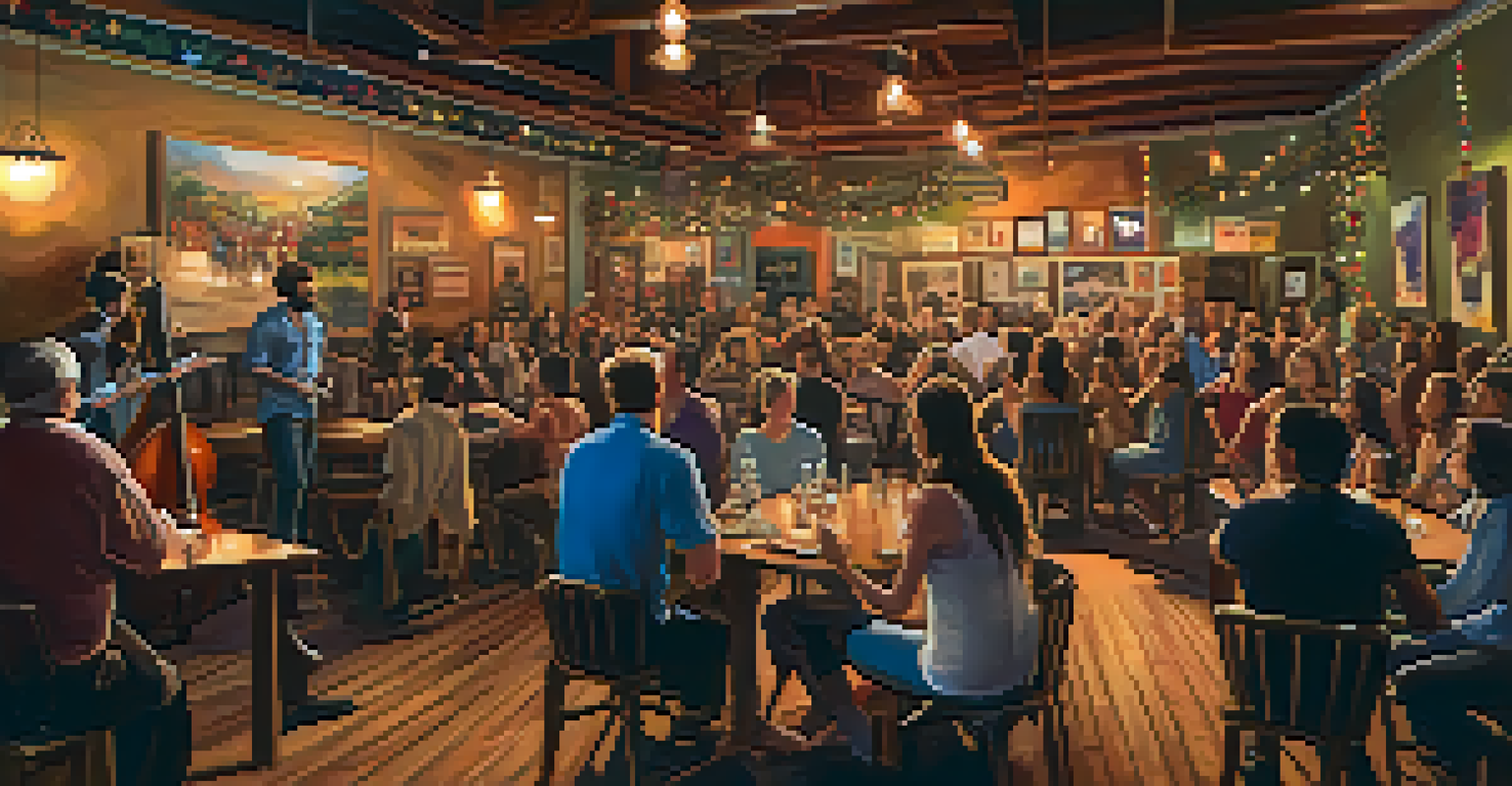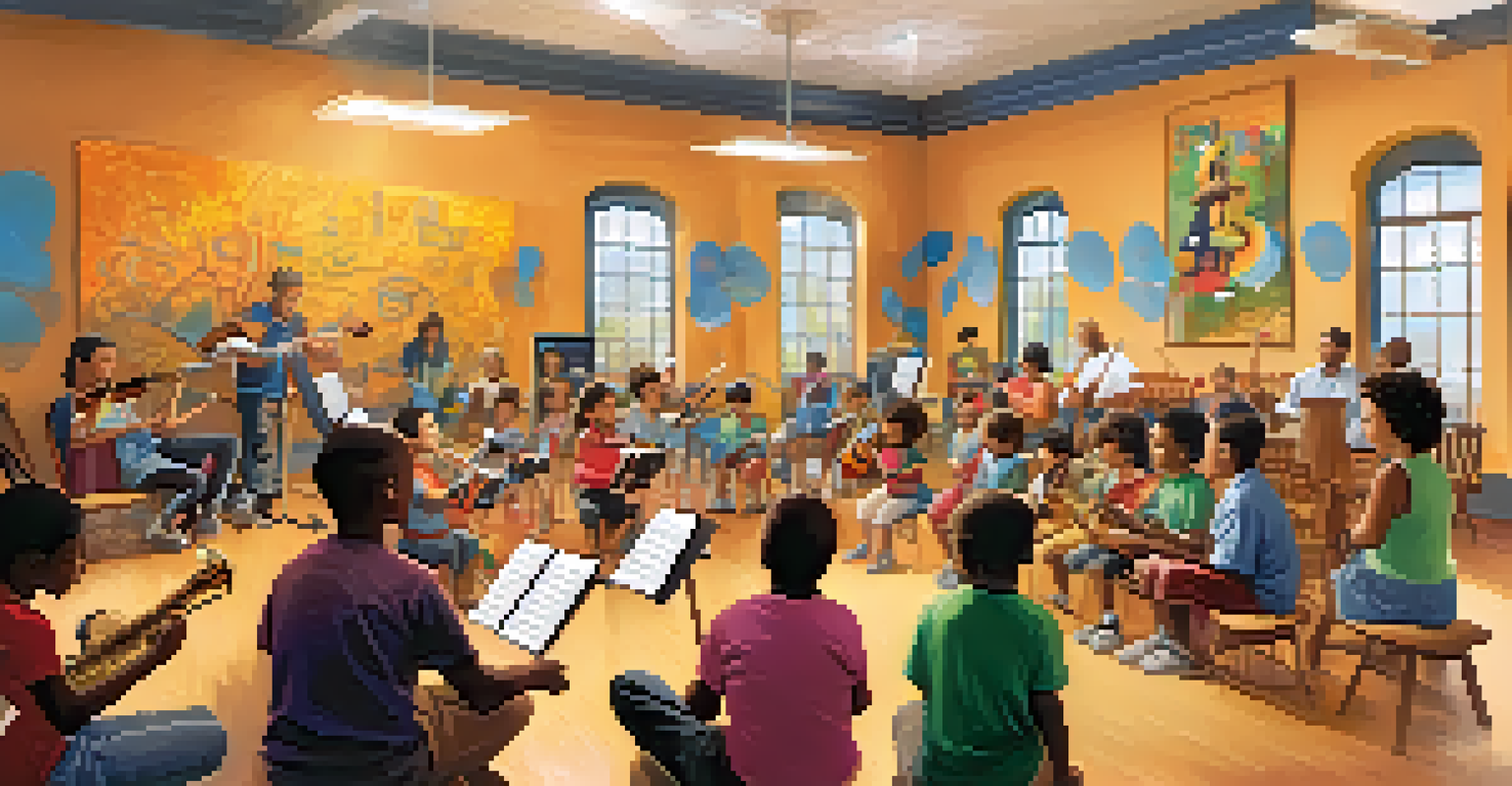The Economic Impact of Music on Local Communities

Music as a Catalyst for Local Economic Growth
Music plays a vital role in stimulating local economies. By hosting concerts and festivals, communities can attract visitors, leading to increased spending in nearby businesses. For instance, a local music festival not only brings in ticket sales but also boosts sales for hotels, restaurants, and retail shops in the area.
Music can change the world because it can change people.
Moreover, the music industry creates job opportunities, from event management to sound engineering. These roles often require local talent, which helps nurture and retain skilled individuals within the community. As a result, the local job market becomes more robust, benefiting residents in various ways.
Ultimately, a thriving music scene can serve as a draw for new businesses and residents who seek vibrant cultural environments. This influx of people can lead to further economic development, creating a cycle of prosperity fueled by the arts.
Creating Jobs Through Music Events and Venues
Music events and venues are significant sources of employment in local areas. From musicians and sound technicians to security staff and marketing professionals, a single concert can create a diverse range of jobs. This not only helps individuals find work but also strengthens the local economy.

Local venues, such as bars and theaters, often rely on music to attract patrons. These establishments become hubs for social gatherings, further boosting the local economy through food and drink sales. A popular live-music venue can become a community staple, providing countless opportunities for employment.
Music Drives Local Economic Growth
Communities benefit economically from music events, attracting visitors and boosting sales in local businesses.
Additionally, the increase in jobs leads to a more vibrant community life. Residents are more likely to engage in local culture and support businesses, creating a dynamic atmosphere that encourages further investment in the arts.
Tourism Boosted by Music Festivals and Events
Music festivals have the power to draw tourists from far and wide, significantly impacting local economies. These events often require extensive planning and resources, leading to increased demand for local services such as accommodations, food, and transportation. For example, cities that host major music festivals often see a significant uptick in hotel bookings and restaurant reservations during event weekends.
Without music, life would be a mistake.
Tourism generated by music events not only brings in immediate revenue but also promotes the area as a destination for future visitors. When tourists have a positive experience, they're likely to return or recommend the destination to others, further expanding the economic benefits.
Moreover, local artisans and craft vendors can benefit from the influx of visitors. Festival organizers often include local vendors in their events, providing them with an opportunity to showcase their products and reach new customers.
Supporting Local Artists and Musicians
Investing in local music helps nurture talent and creativity within the community. By providing platforms for local artists, such as open mic nights or community festivals, towns can foster a sense of pride and ownership in their cultural landscape. This grassroots support is crucial for the artistic development of musicians and can lead to significant recognition.
When local artists succeed, they often reinvest their earnings back into the community. This might include hiring local services, collaborating with other creatives, or even mentoring upcoming musicians. Such practices create a flourishing ecosystem where art and economy support one another.
Job Creation Through Music Events
Music events and venues create diverse job opportunities, enhancing the local job market and community engagement.
Furthermore, the presence of local artists enhances the community's cultural identity. This unique character can attract tourists and new residents who appreciate and value vibrant local art scenes.
Music's Role in Community Cohesion and Identity
Music often serves as a unifying force in communities, bringing people together across different backgrounds. Local events allow residents to share experiences, fostering a sense of belonging and community pride. This connection can be particularly impactful in diverse neighborhoods, where music becomes a common language that transcends barriers.
Moreover, community music programs can provide valuable opportunities for youth engagement. By involving young people in music education and performance, communities can offer positive outlets for creativity and collaboration. This helps develop essential life skills while also strengthening community ties.
As residents participate in music-related activities, they contribute to a shared cultural identity. This collective experience not only enhances the community's character but can also promote civic engagement and participation in local issues.
The Impact of Music on Mental Health and Well-being
The benefits of music extend beyond economics; they also touch on the mental health and well-being of community members. Participating in musical activities—whether performing, listening, or even dancing—can significantly reduce stress and promote a sense of happiness. This positive emotional impact can lead to healthier, more vibrant communities.
Communities that prioritize music often see enhanced social connections, which are vital for mental well-being. Regular musical gatherings, such as community sing-alongs or concerts, create opportunities for social interaction and bonding, reducing feelings of isolation.
Music Fosters Community Cohesion
Music unites residents, promoting a sense of belonging and enhancing the community's cultural identity.
Additionally, music therapy has gained recognition as an effective tool for mental health treatment. By incorporating music into local health programs, communities can provide essential support to those in need, further enhancing the overall quality of life.
The Future of Music's Economic Influence on Communities
As technology evolves, so does the music industry, presenting new opportunities for local economies. Streaming services and social media platforms allow artists to reach wider audiences, which can lead to increased local recognition. Communities that adapt to these changes can harness technology to further promote their local music scenes.
Furthermore, local governments are increasingly recognizing the economic potential of music. By investing in infrastructure for venues and supporting music education programs, policymakers can create an environment conducive to artistic growth. This proactive approach can lead to sustainable economic development fueled by the arts.

In conclusion, the future looks promising for the intersection of music and local economies. As communities continue to embrace the power of music, they can strengthen their economies while also enriching the cultural fabric of society.